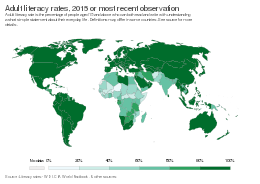
Back Geletterdheid Afrikaans Alphabetisierung (Lesefähigkeit) ALS Alfabetización AN محو الأمية Arabic تسكويل ARY সাক্ষৰতা Assamese Alfabetización AST Уҡый-яҙа белеү Bashkir Raštingoms BAT-SMG Граматнасць Byelorussian
This article may be too long to read and navigate comfortably. When this tag was added, its readable prose size was 14,000 words. (April 2023) |
| Part of a series on |
| Reading |
|---|
 |
Literacy is the ability to read and write. Broadly, literacy may be viewed as "particular ways of thinking about and doing reading and writing"[1] with the purpose of understanding or expressing thoughts or ideas in written form in some specific context of use.[2] In other words, humans in literate societies have sets of practices for producing and consuming writing, and they also have beliefs about these practices.[3] Reading, in this view, is always reading something for some purpose; writing is always writing something for someone for some purpose.[4] Beliefs about reading and writing and their value for society and for the individual always influence the ways literacy is taught, learned, and practiced.[5]
Some researchers suggest that the study of "literacy" as a concept can be divided into two periods: the period before 1950, when literacy was understood solely as alphabetical literacy (word and letter recognition); and the period after 1950, when literacy slowly began to be considered as a wider concept and process, including the social and cultural aspects of reading and writing[6] and functional literacy.[7][8]

- ^ Street, Brian (2001). "Introduction". Literacy and Development: Ethnographic Perspectives. London: Routledge. p. 11.
- ^ Rowsell, Jennifer; Pahl, Kate (2020). The Routledge Handbook of Literacy Studies. Routledge. ISBN 978-0-367-50172-3.
- ^ Calvet, Louis-Jean (1999). Towards an Ecology of World Languages. Polity. ISBN 978-0-745-62956-8.
- ^ Lankshear, Colin; Knobel, Michelle (2007). "Sampling the 'New' in New Literacies". A New Literacies Sampler. New York: Peter Lang. p. 2. ISBN 978-0-820-49523-1.
- ^ Lindquist, Julie (2015). "Literacy". Keywords in Writing Studies. Logan: Utah State UP. pp. 99–102.
- ^ Gee, James (1991). "Socio-Cultural Approaches to Literacy (Literacies)". Annual Review of Applied Linguistics. 12: 31–48. doi:10.1017/S0267190500002130. S2CID 146415110.
- ^ Dijanošić, B. (2009). "Prilozi definiranju pojma funkcionalne pismenosti" [Contributions to the definition of functional literacy] (PDF). Journal of the Croatian Andragogy Society (in Croatian): 25–35.
- ^ Réka, Vágvölgyi; Bergström, Aleksandar; Bulajić, Maria Klatte; Falk, Huettig (May 2019). "Understanding functional illiteracy from a policy, adult education, and cognition point of view: Towards a joint referent framework". Zeitschrift für Neuropsychologie. 30 (2): 111. doi:10.1024/1016-264X/a000255. S2CID 191662777.
- ^ "Adult literacy rates, 2015 or most recent observation". Our World in Data. Retrieved 15 February 2020.
© MMXXIII Rich X Search. We shall prevail. All rights reserved. Rich X Search